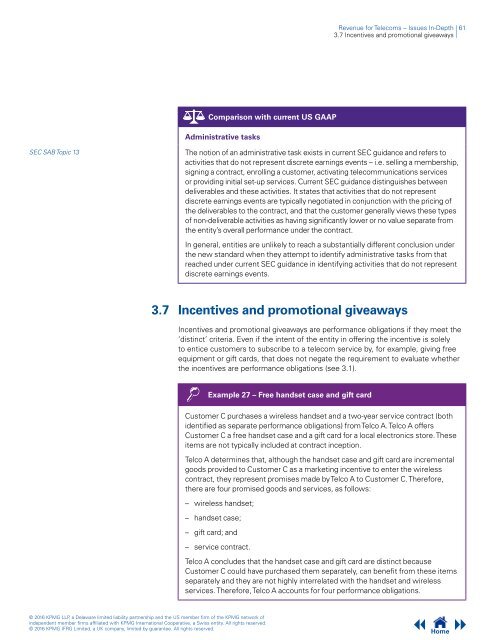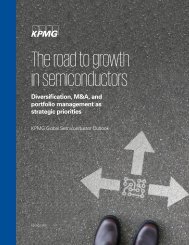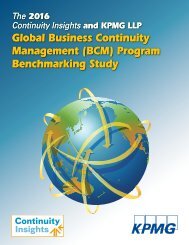Revenue for Telecoms
2cdncba
2cdncba
You also want an ePaper? Increase the reach of your titles
YUMPU automatically turns print PDFs into web optimized ePapers that Google loves.
<strong>Revenue</strong> <strong>for</strong> <strong>Telecoms</strong> – Issues In-Depth | 61<br />
3.7 Incentives and promotional giveaways |<br />
Comparison with current US GAAP<br />
Administrative tasks<br />
SEC SAB Topic 13<br />
The notion of an administrative task exists in current SEC guidance and refers to<br />
activities that do not represent discrete earnings events – i.e. selling a membership,<br />
signing a contract, enrolling a customer, activating telecommunications services<br />
or providing initial set-up services. Current SEC guidance distinguishes between<br />
deliverables and these activities. It states that activities that do not represent<br />
discrete earnings events are typically negotiated in conjunction with the pricing of<br />
the deliverables to the contract, and that the customer generally views these types<br />
of non-deliverable activities as having significantly lower or no value separate from<br />
the entity’s overall per<strong>for</strong>mance under the contract.<br />
In general, entities are unlikely to reach a substantially different conclusion under<br />
the new standard when they attempt to identify administrative tasks from that<br />
reached under current SEC guidance in identifying activities that do not represent<br />
discrete earnings events.<br />
3.7 Incentives and promotional giveaways<br />
Incentives and promotional giveaways are per<strong>for</strong>mance obligations if they meet the<br />
‘distinct’ criteria. Even if the intent of the entity in offering the incentive is solely<br />
to entice customers to subscribe to a telecom service by, <strong>for</strong> example, giving free<br />
equipment or gift cards, that does not negate the requirement to evaluate whether<br />
the incentives are per<strong>for</strong>mance obligations (see 3.1).<br />
Example 27 – Free handset case and gift card<br />
Customer C purchases a wireless handset and a two-year service contract (both<br />
identified as separate per<strong>for</strong>mance obligations) from Telco A. Telco A offers<br />
Customer C a free handset case and a gift card <strong>for</strong> a local electronics store. These<br />
items are not typically included at contract inception.<br />
Telco A determines that, although the handset case and gift card are incremental<br />
goods provided to Customer C as a marketing incentive to enter the wireless<br />
contract, they represent promises made by Telco A to Customer C. There<strong>for</strong>e,<br />
there are four promised goods and services, as follows:<br />
– wireless handset;<br />
– handset case;<br />
– gift card; and<br />
– service contract.<br />
Telco A concludes that the handset case and gift card are distinct because<br />
Customer C could have purchased them separately, can benefit from these items<br />
separately and they are not highly interrelated with the handset and wireless<br />
services. There<strong>for</strong>e, Telco A accounts <strong>for</strong> four per<strong>for</strong>mance obligations.<br />
© 2016 KPMG LLP, a Delaware limited liability partnership and the US member firm of the KPMG network of<br />
independent member firms affiliated with KPMG International Cooperative, a Swiss entity. All rights reserved.<br />
© 2016 KPMG IFRG Limited, a UK company, limited by guarantee. All rights reserved.<br />
Home







